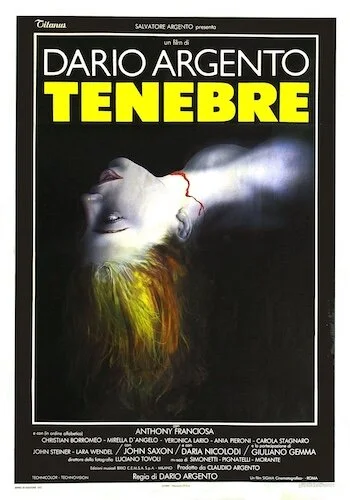Tenebrae: 31 Days of Horror
For all of October, we will review horror films. Submit your requests here, and you may see your picks selected!
No filmmakers have risen (to the very top of a genre) and fallen (to the same genre’s rock bottom) like Dario Argento. His rise as the king of giallo was rather swift in the ‘70s, erupting as the crowning achievement of theatrical, aesthetic horrors Suspiria. Before that, he had perfected the Italian horror scene’s signature ways with The Bird with the Crystal Plumage: his debut. He would hop around the same genre a lot, but Argento always managed to make do with the confinements of Italian slasher excessive pictures. He would leave one last hurrah with the terrific onslaught of the senses known as Opera, but after that was a dip unlike we have ever seen. It’s as if he began to believe the cheesiness and melodramatic ways of his horror, rather than being the orchestrator of these sensations. His films can border on the edge of intolerability now, and it’s a damn shame, coming from someone who — I would argue — was on top of the horror genre as one of the greats.
Before Opera, there was a slight hint of the direction he would head, but he still managed to finish the film unscathed and in control. That film was Tenebrae: a culmination of his old obsessions with the same visions that would eventually overtake him completely. It’s business as usual here: gorgeous gore, an otherworldly sensation (even if there might not be one), and a tongue-in-cheek playfulness that combats the sheer terror on screen. The major plot point that keeps Tenebrae on track for Argento’s sake is the fringe satirical tone of its self referential ways: an author is dealing with a serial killer hinged on using his latest book for clues and subsequent murders. It’s as if Argento was standing at a distance from the very specialized horror genre he reinvented, and said “this is what fanaticism looks like”. It felt like commentary on the dissection of each and every work by aficionados that need to absorb all of the minutiae that an artist may not even know they’re making with their creations. Even though Argento would eventually lose the plot, it felt like he was beyond aware before.
Tenebrae, like other Argento masterworks, is beautifully designed, even during its more morbid moments.
Even at his best, Argento embodied some very problematic behaviours often attached to horror, especially the slaughtering of women. I feel like it was his choice to use women as victims because he wanted to make horror as beautiful as possible, but that also doesn’t help his case (it might actually make it worse, considering you can argue he’s objectifying women at that point). Tenebrae tries to comment on this toxic behaviour a little bit, but I think it’s a bit of a misfire: Opera seems to drive this point Argento tried to make much better. Tenebrae discusses the issues with the fascination of the murdering of women in art actually literally, given the context of the written work within the film being used as a criminal set of blueprints. However, doesn’t that prove that Argento was trying to comment on himself, here? I know I’m beating a dead horse, but I’ll never understand how a director who felt almost omnipresent with his attention in the giallo genre could become oblivious entirely.
While this failed attempt at cinematic justification might get in the way (it feels much more apparent since Argento is actually discussing it within his film), Tenebrae is a stunning slasher film otherwise. Full of inventive murders — something Argento was always great at — Tenebrae is like an art gallery of demise. The climactic slaying has been discussed time and time again, because of the execution (no pun intended) of this very precise sickness. Even the killings that are stepping stones make a loud statement, as if pausing the film at any moment would result in an album cover that would be banned by the PRMC, most likely (but album covers nonetheless). Underneath the hyperbole, the enthusiasm for gore, the scares and the perversions, is an ability to curate the worst images in the greatest of ways. Again, it’s what Argento mastered, and a main reason why even his lowest efforts have the occasional highlight (well, maybe not all of them). Tenebrae is as pretty as it is ugly. It is token Argento, when he still knew how to make the best end results with his pulp murder thrillers.
Andreas Babiolakis has a Masters degree in Film and Photography Preservation and Collections Management from Ryerson University, as well as a Bachelors degree in Cinema Studies from York University. His favourite times of year are the Criterion Collection flash sales and the annual Toronto International Film Festival.






